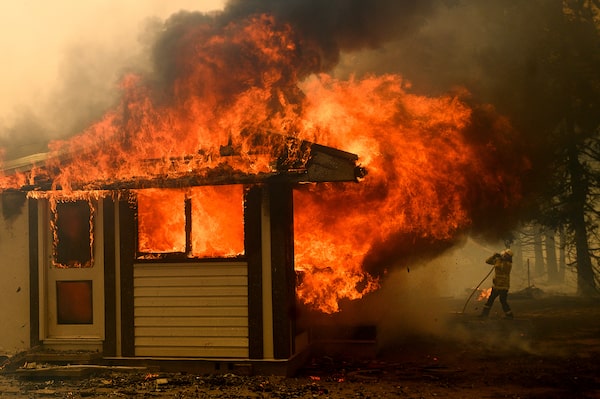
A firefighter battles the Morton Fire as it consumes a home near Bundanoon, New South Wales, Australia, Thursday, Jan. 23, 2020. (AP Photo (AP Photo/Noah Berger)Noah Berger/The Associated Press
Richard Ogier is an Australian journalist and consultant.
After the apocalyptic scenes of bushfires in Australia – more evidence, according to one historian, we’ve entered the Pyrocene, the “Age of Fire” – flash flooding has come to parts of the country’s east and west coasts. Byron Bay, a popular holiday destination about 750 kilometres north of Sydney, got almost 300 millimetres of rain in 24 hours.
Yet, the wider angle on the climate crisis that has racked Australia since September – the fires claiming 33 lives – might be called the “The Vengeance of the Facts,” or more precisely, “The Lesson of the Facts," for government leaders and policy-makers in particular.
It bears repeating: The science of climate change in Australia, home to vast but fragile biodiversity, has been clear for more than a decade, as the world’s driest (apart from Antarctica) continent gets relentlessly drier and hotter, so droughts and fires will worsen over a longer fire season, encompassing more of the national territory.
How horrifying that reality has now become – lives lost; air quality shockingly degraded; some 3,600 homes destroyed or damaged; more than 11.5 million hectares scorched (almost the land area of England); a mind-boggling billion animals and their habitats incinerated. The risk now is to water supplies and their fish stocks, as ash and debris wash into waterways.
Populations of the emblematic kangaroo and koala have been very hard hit, apparently catching the imagination of many North Americans. But on pristine Kangaroo Island near Adelaide in South Australia, the glossy black cockatoo and dark-eyed dunnart, a cute-as-they-come marsupial, are now at dire risk of extinction. Before fires blackened more than a third of the island, it was estimated there were only about 500 of the little dunnart left.
After the facts, the experience. It seems to me that local journalists have given an accurate picture of what Australians are actually living. Concentration of media ownership is a major concern, putting a squeeze on the diversity of views in the press – making even bushfires an ideological subject, while dirty, heavily subsidized coal continues to get remarkably favourable coverage. But that hasn’t stopped often moving accounts of, memorably, 4,000 people taking shelter on a regional beach under a glowing red sky.
Less edifying have been those editors and headline writers who’ve insisted on calling firefighters “soldiers,” when war would normally involve guns and invading armies. The related technique is to characterize a group of individuals, in this case firefighters, and generalize their qualities to the rest of us. So volunteers risking their necks to fight the worst fires the country has ever known embody a combative spirit and sense of solidarity that is unique to all Australians. Why is it that populism and its chanticleers in the media talk about a country and its people as if urging those who already live there to visit?
But the condescending non-empathy award surely goes to the Australian Prime Minister Scott Morrison. Not just for continuing, seemingly willful ignorance of the facts around climate change, but a resounding lack of humility in the face of the people who have suffered because of it. Images of Mr. Morrison’s clam-handed attempt to shake hands with a disgruntled firefighter were seen around the world.
Marcus Aurelius described what we think of today as “empathic listening,” advising: “Try your best to enter into the mind of the speaker.” But this was a corporate shake-my-hand for the cameras, as if “Scomo” or “Smoko” or “Scotty from marketing,” as he’s been variously dubbed, had taken himself offline, was simply, “not receiving.” But it might be that voters feel they’ve got the measure of this Prime Minister.
If Australian democracy is functioning as it should, the facts and the experience of these past weeks and months will have cost Mr. Morrison and his slow-mo government dearly. A turning point is the realization – the transformational insight, surely – that the old ways of thinking about climate change and the environment are no longer possible. A profound perspective change, amid the fire and rain, in the history of Australian politics? This, we sincerely hope.
Keep your Opinions sharp and informed. Get the Opinion newsletter. Sign up today.